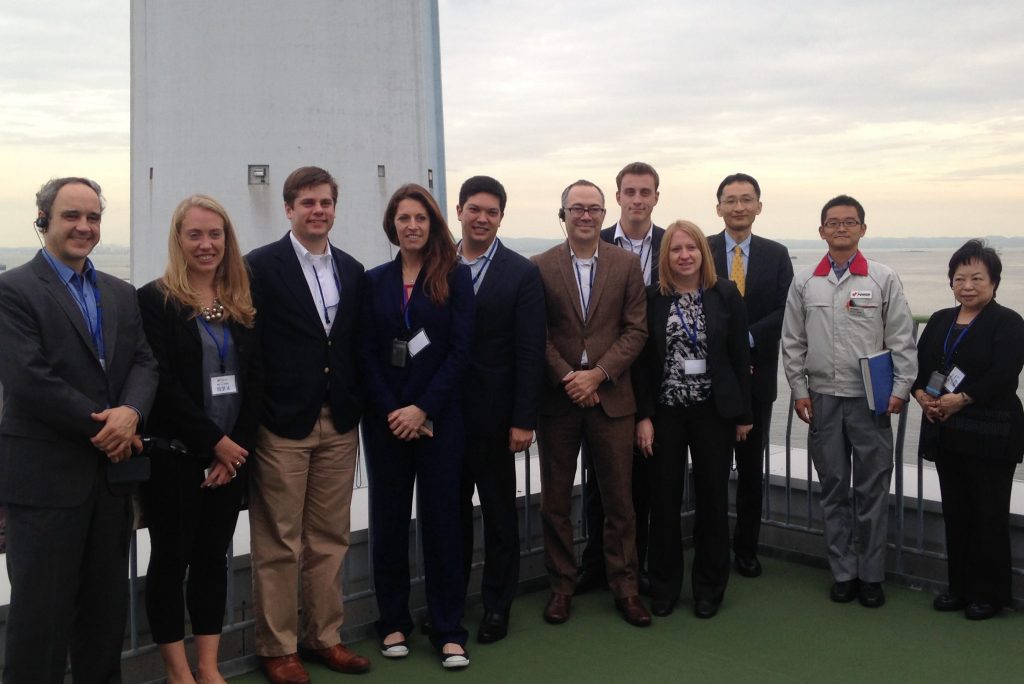A delegation of seven Congressional staff traveled on a weeklong program to Tokyo, Yokohama, and Okinawa on November 7–14, 2015, to meet with a wide range of Japanese leaders, government representatives, and policy experts for discussions about the dynamics shaping the US-Japan alliance. The program had a special focus on bilateral security cooperation, and the group was able to speak with key figures in charge of managing the alliance, visit US and Japanese military bases, and then travel to see firsthand the US base that is at the center of so much controversy—Marine Corps Air Station Futenma—as well as Henoko Village, where its proposed replacement is being constructed.
Participants
CYRUS ARTZ, Legislative Director, Office of Representative Virginia Foxx (R-NC)
ANTHONY CHING, Senior Legislative Assistant, Office of Representative Tulsi Gabbard (D-HI)
BECKY COLE, Budget Analyst, Senate Budget Committee (Rep. Mike Enzi, R-WY)
CAROLINE DARMODY, Legislative Assistant, Office of Representative Joseph P. Kennedy (D-MA)
STEVEN FELDGUS, Senior Energy Policy Advisor, House Natural Resources Committee (Rep. Raúl Grijalva, D-AZ)
ALLEN KLUMP, Deputy Chief of Staff, Office of Representative Jeff Duncan (R-SC)
KATE MacGREGOR, Senior Professional Staff, House Committee on Natural Resources Subcommittee on Energy and Mineral Resources (R)
The US Congressional Staff Exchange Program at a Glance
• Over the past four decades, nearly 1,200 leaders have taken part in JCIE’s political exchange programs.
• Since its inception in 1982, a total of 170 participants have traveled to Japan on the US Congressional Staff Exchange Program.
• The 2015 delegation spoke with more than 40 political leaders, government officials, and experts, including Health Minister Yasuhisa Shiozaki, Chief TPP Negotiator Koji Tsuruoka, and former International Energy Agency Executive Director Nobuo Tanaka.
• In Okinawa, the group was briefed by American and Japanese officers at Kadena US Air Base and Japan’s Naha Air Base, they visited the sites of the US Marine Corps base in Futenma and the proposed Futenma relocation facility in Henoko, and they spoke with local proponents and opponents of the base relocation, as well as key national-level officials involved in the relocation process.
• The group also received a special briefing at J-Power’s Isogo Thermal Power Plant in Yokohama, which is considered the world’s most advanced clean coal plant.
• Prior to their departure for Japan, delegation members took part in a briefing on US-Japan security relations by Dr. Jeffrey Hornung (Sasakawa Peace Foundation USA).
• The program is funded by the Japan-US Friendship Commission, a US federal agency.
Japan’s Tense Politics
As the delegation arrived in Tokyo, Japan’s ruling and opposition parties were engaged in an increasingly bitter clash. Several of the experts that the group met, including noted political commentator Hiroshi Hoshi, explained that the immediate trigger was dissatisfaction among the opposition camp as well as the general public about how Prime Minister Abe had pushed through a package of bills to expand the role of Japan’s military and better equip it to cooperate with the United States. The debate over the security legislation hurt the Abe cabinet’s polling, so several analysts noted that his top task would now have to be to regain public support in order to avoid a poor showing in the summer 2016 Upper House elections.
Abenomics and the TPP
The prospects for the prime minister’s signature economic initiative—“Abenomics”—and its relationship with the Trans-Pacific Partnership (TPP), came up in numerous meetings, including in discussions with Japan’s chief negotiator for the TPP accord, Koji Tsuruoka. One analyst noted that the Abe Cabinet feels that the adoption of the TPP is absolutely necessary for Japan to successfully implement the structural reforms that are considered the third and final key component—the “third arrow”—of Abenomics.
If the US Congress fails to ratify the TPP accord, several experts argued, this will both undercut Japan’s structural reforms and greatly undermine Abe’s leadership, leading to a sense that the United States is unreliable at a time when China is also jockeying for power in the region.
Japan’s Energy Dilemma
The shutdown of all of the country’s nuclear reactors after the 2011 Fukushima meltdown took nearly 30 percent of Japan’s electricity generation capacity offline, so it was no surprise that energy issues were a major topic in many of the delegation’s discussions, in addition to being the main focus in their meeting with former International Energy Agency head Nobuo Tanaka and their site visit to Isogo Power Plant, the world’s most advanced clean coal plant. Energy has become a contentious issue in Japanese politics in the past several years. Tanaka argued that the declining price of oil and natural gas has actually helped save Abenomics in light of how quickly Japan had to ramp up its imports of those to make up for the loss of nuclear generation capacity.
Others explained that, domestically, Japan’s energy future has become an increasingly partisan issue, with many in the ruling Liberal Democratic Party (LDP) pushing for the restart of the nuclear plants while the main opposition party has argued that Japan needs to instead focus on safer renewable energy sources. Some argued that this issue even threatens the ruling coalition itself since the LDP’s junior coalition partner, the Komeito Party, takes the position that nuclear energy should be phased out over the next several decades.
Regional Relations in Northeast Asia
The issue of China’s growing influence and increasingly assertive behavior figured prominently in nearly every meeting. One of Japan’s leading China scholars, Tokyo University Professor Akio Takahara, explained that Japan’s relations with China are now warming, but large perception gaps still divide the two countries. Remarkably, Chinese tourism in Japan has soared in recent years, with the number of Chinese visitors doubling from a record 2.4 million in 2014 to somewhere in the range of 5 million for 2015, and these people-to-people interactions may help improve bilateral relations over the long term.
However, concerns over China’s military activity continue to grow, especially in light of its recent moves in the South China Sea. One former senior government official noted that military planners are now worried that the 12 new drilling platforms that China has constructed since 2013 in the East China Sea might be used for military purposes.
Despite these concerns, many experts who met with the group were also able to find potential areas of conciliation. For example, several argued that Japan should reconsider joining the Asian Infrastructure Investment Bank that China has launched.
Managing the US-Japan Alliance
The issue of China loomed over the group’s discussions on US-Japan security cooperation, although one of the main topics was the simmering dispute over the relocation of Marine Corps Air Station Futenma, which has dragged on for 19 years despite widespread agreement that it is too dangerous to allow the Futenma base to remain in its current location. The delegation spoke about the basing dispute with a wide range of experts in Tokyo and Okinawa—including with Hitoshi Tanaka, the former senior foreign ministry official who negotiated the original relocation plan, and Lt. Gen. Koichiro Bansho, who recently commanded Japan’s Western Army. They also traveled to see the relocation site, which is the focal point of a nationwide protest movement, and were briefed by officers from the US Marine Corps and the US Air Force at Kadena Air Base, as well as by Japanese Self-Defense Force officers and fighter pilots responsible for patrolling Japan’s territorial air space out of Naha Air Base.
Roughly 50,000 US service members, dependents, and military contractors, plus another 6,000– 7,000 Japanese Self-Defense Forces personnel, live in Okinawa, a series of islands with a total population of 1.2 million. Everyone that the delegation met with acknowledged that the concentration of military bases—and especially US bases—in Okinawa is far too high. And even Okinawan experts who are opposed to the Futenma relocation plan insisted that the Okinawan people understand the strategic value of keeping US bases in the prefecture and generally are not in favor of eliminating all of them.
However, numerous people told the group that Okinawans tend to harbor a sense of being discriminated against by mainland Japan, and many feel that creating a new base, the Futenma replacement facility, is just too much. Several senior foreign policy experts who spoke with the delegation confided their concerns that as opposition to the base relocation hardens, it may morph into a movement to get rid of all of the US bases in Okinawa—an “all or nothing” proposition. Yet the Abe government has shown no signs of backing down on the relocation, and the low intensity level of the protests that the delegation members saw at the relocation site gave no indication that there would be any change in course in the near future.



